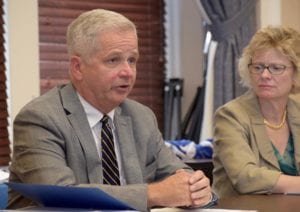Who is a member?
Our members are the local governments of Massachusetts and their elected and appointed leadership.

Massachusetts Department of Environmental Protection Commissioner Martin Suuberg talks about the challenges facing municipalities regarding recycling during the Local Government Advisory Commission meeting at the State House on Sept. 11. Listening is MMA Vice President and Norwell Selectman Ellen Allen.
State and municipal officials are working to address the challenges caused by recent upheaval in the recycling marketplace.
Until recently, the majority of recyclable material collected by Massachusetts municipalities was purchased by China for processing. Many municipalities paid low fees to have their recycling hauled, and some even earned money from haulers for the materials.
Over time, the in-state market for processing recyclables such as paper and glass declined, as these businesses could not compete with the Chinese market.
On Jan. 1, the recycling market in Massachusetts and across the country experienced a massive disruption as China announced that it would no longer import 24 types of materials, including mixed paper and several types of plastic. Citing the increasing rate of impurities in the U.S. recycling stream, China, under its new National Sword policy, now will only accept materials with a contamination rate of one-half of 1 percent or less.
National Sword plunged the Massachusetts recycling market into distress, as intermediaries scrambled to find new buyers for the banned recyclables. Costs to municipalities increased significantly, forcing some to divert their recycling to landfills, store it in holding facilities, or ship it out of state.
At an event in Salem on Aug. 20, the Baker-Polito administration and the Massachusetts Department of Environmental Protection unveiled a new Recycle Smart educational campaign and a grant funding program.
The Recycle Smart website (recyclesmartma.org) provides information for consumers about how to recycle properly. A Recylopedia search allows users to type in the names of commonly discarded items, such as straws or pizza boxes, to learn whether they should be recycled or trashed.
MassDEP hopes the education campaign will result in a cleaner recycling stream that will then attract new markets for processing.
The administration also announced $2.6 million in grants to 247 Massachusetts municipalities and solid waste districts through the Sustainable Materials Recovery Program. Recipients were identified as performing well in recycling efforts, with the funding intended to encourage additional investment in this area.
At the Sept. 11 meeting of the Local Government Advisory Commission, municipal officials discussed how their communities are navigating the changing landscape of recycling.
Auburn Town Manager Julie Jacobson praised MassDEP’s Recycle Smart campaign and noted that her town has already made the state’s recycling education materials available to residents. Jacobson also thanked MassDEP for an $11,000 grant Auburn received through the Sustainable Materials Recovery Program, which it will use to continue their recycling education and outreach efforts on platforms including the town website, cable television, social media, and electronic billboards.
Sherborn Selectman Paul DeRensis spoke to the challenging fiscal impacts of trash and recycling in his town, where the cost of hauling recyclables now exceeds the cost for solid waste by $20 per ton. DeRensis and other town officials are discussing their options for maintaining a fiscally sustainable recycling program under current conditions.
MassRecycle Executive Director Edward Hsieh and Vice President Waneta Trabert visited the MMA Policy Committee on Energy and the Environment on Sept. 12 to give a recycling marketplace update and discuss the group’s legislative efforts, particularly in the area of “product stewardship,” meaning that manufacturers would take a product, such as a mattress, back at the end of its life and recycle it or dispose of it properly.
The policy committee is working on a recycling resolution for presentation to the MMA Annual Business Meeting in January as well as a best practice document for the MMA Annual Meeting.